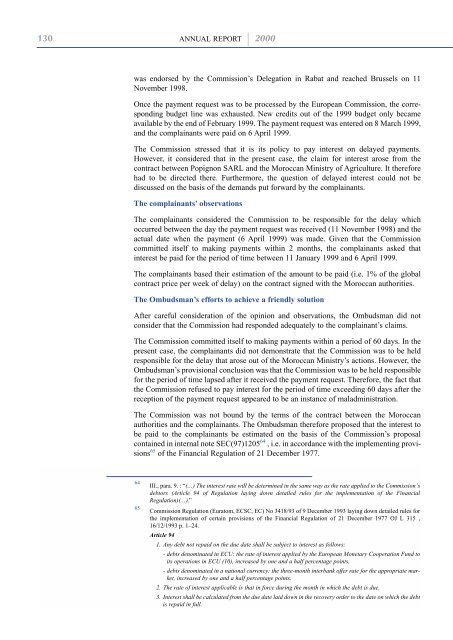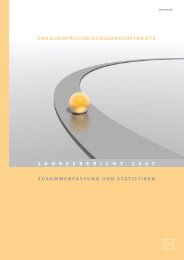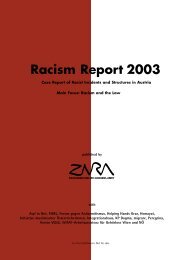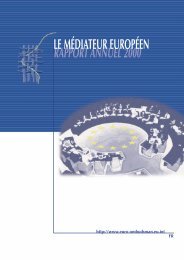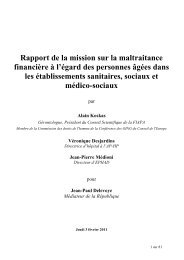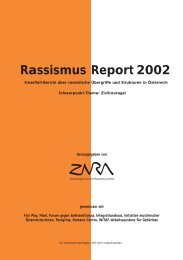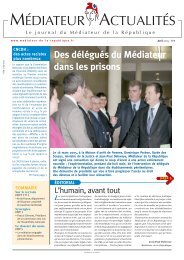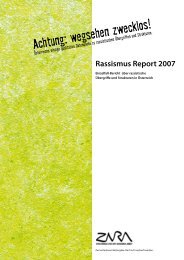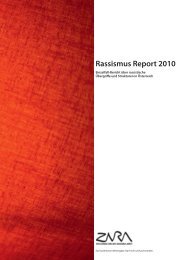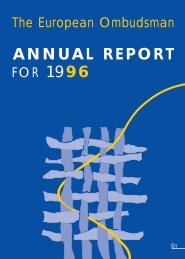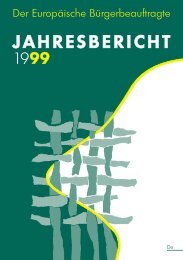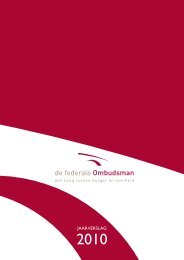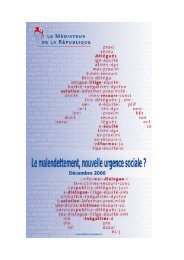Annual report 2000
Annual report 2000
Annual report 2000
Create successful ePaper yourself
Turn your PDF publications into a flip-book with our unique Google optimized e-Paper software.
130 ANNUAL REPORT | <strong>2000</strong>was endorsed by the Commission’s Delegation in Rabat and reached Brussels on 11November 1998.Once the payment request was to be processed by the European Commission, the correspondingbudget line was exhausted. New credits out of the 1999 budget only becameavailable by the end of February 1999. The payment request was entered on 8 March 1999,and the complainants were paid on 6 April 1999.The Commission stressed that it is its policy to pay interest on delayed payments.However, it considered that in the present case, the claim for interest arose from thecontract between Popignon SARL and the Moroccan Ministry of Agriculture. It thereforehad to be directed there. Furthermore, the question of delayed interest could not bediscussed on the basis of the demands put forward by the complainants.The complainants’ observationsThe complainants considered the Commission to be responsible for the delay whichoccurred between the day the payment request was received (11 November 1998) and theactual date when the payment (6 April 1999) was made. Given that the Commissioncommitted itself to making payments within 2 months, the complainants asked thatinterest be paid for the period of time between 11 January 1999 and 6 April 1999.The complainants based their estimation of the amount to be paid (i.e. 1% of the globalcontract price per week of delay) on the contract signed with the Moroccan authorities.The Ombudsman’s efforts to achieve a friendly solutionAfter careful consideration of the opinion and observations, the Ombudsman did notconsider that the Commission had responded adequately to the complainant’s claims.The Commission committed itself to making payments within a period of 60 days. In thepresent case, the complainants did not demonstrate that the Commission was to be heldresponsible for the delay that arose out of the Moroccan Ministry’s actions. However, theOmbudsman’s provisional conclusion was that the Commission was to be held responsiblefor the period of time lapsed after it received the payment request. Therefore, the fact thatthe Commission refused to pay interest for the period of time exceeding 60 days after thereception of the payment request appeared to be an instance of maladministration.The Commission was not bound by the terms of the contract between the Moroccanauthorities and the complainants. The Ombudsman therefore proposed that the interest tobe paid to the complainants be estimated on the basis of the Commission’s proposalcontained in internal note SEC(97)1205 64 , i.e. in accordance with the implementing provisions65 of the Financial Regulation of 21 December 1977.6465III., para. 9. : “(…) The interest rate will be determined in the same way as the rate applied to the Commission’sdebtors (Article 94 of Regulation laying down detailed rules for the implementation of the FinancialRegulation)(…).”Commission Regulation (Euratom, ECSC, EC) No 3418/93 of 9 December 1993 laying down detailed rules forthe implementation of certain provisions of the Financial Regulation of 21 December 1977 OJ L 315 ,16/12/1993 p. 1–24.Article 941. Any debt not repaid on the due date shall be subject to interest as follows:- debts denominated in ECU: the rate of interest applied by the European Monetary Cooperation Fund toits operations in ECU (10), increased by one and a half percentage points,- debts denominated in a national currency: the three-month interbank offer rate for the appropriate market,increased by one and a half percentage points.2. The rate of interest applicable is that in force during the month in which the debt is due.3. Interest shall be calculated from the due date laid down in the recovery order to the date on which the debtis repaid in full.


